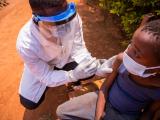Adult survivors of childhood cancer may remain at elevated risk for severe COVID-19 for decades after their cancer diagnosis, a Karolinska Institutet-led research team writes in The Lancet Regional Health–Europe.
The study, published late last week, used Danish and Swedish registry data to compare rates of COVID-19 infection and severe cases among 13,659 childhood cancer survivors diagnosed before age 20 with those of their 17,531 siblings and 58,803 community controls from 2020 through 2022. All participants were at least 20 years old when the pandemic began, with an average age of about 41 at study enrollment.
Advanced diagnostic tests and progress in the treatment of childhood cancers have improved survival substantially, with 5-year-survival exceeding 85% in high-income countries, the study authors noted. "However, these survivors represent a vulnerable group, with a markedly higher risk of chronic health conditions and premature mortality compared to the general population," they wrote.
Risk higher in Sweden than Denmark
While childhood cancer survivors were at lower risk for COVID-19 infection than controls (adjusted hazard ratio [aHR], 0.91), they were at higher risk for severe outcomes (hospitalization, intensive care unit admission, or death) if they were infected (aHR, 1.58).
Stratified analyses revealed a notable increase in risk among cancer survivors aged 50 years or older at baseline (aHR, 1.85), survivors of solid tumors (aHR, 1.63), and those who received a cancer diagnosis at age 15 years or older (aHR, 2.28).



















